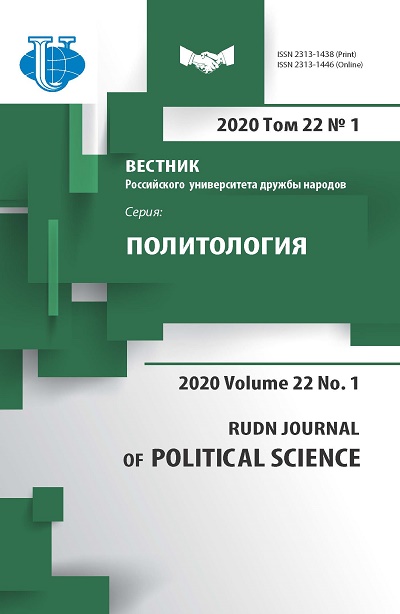Russia in Anticipation of Changes: Religious Factor and Socio-political Preferences
- Authors: Mchedlova M.M.1,2, Kofanova E.N.2
-
Affiliations:
- Peoples’ Friendship University of Russia (RUDN University)
- Institute of Sociology of the Federal Center of Theoretical and Applied Sociology of the Russian Academy of Sciences
- Issue: Vol 22, No 1 (2020)
- Pages: 7-21
- Section: POLITICAL PROCESS IN CONTEMPORARY RUSSIA: TENDENCIES AND PROSPECTS
- URL: https://journals.rudn.ru/political-science/article/view/23273
- DOI: https://doi.org/10.22363/2313-1438-2020-22-1-7-21
Cite item
Full Text
Abstract
The religious factor is now at the focus of theoretical and public discussions, addressing the issues of understanding and evaluation of its manifestation forms in various spheres of society: intra-Church, private, public and political. Numerous research focuses account for the variability of interpretations of how the religious factor impacts the political process, in Russia among other countries. The political connotations of the religious factor in relation to the domestic political sphere imply identification of its impact on the nature of socio-political demands, assessment of the situation in the country, visions of development, unity or demarcation lines in public consciousness and behavior. Demand for change in Russian society is shared by all religious and ideological groups, which is confirmed by sociological studies. This demand manifests itself in a plea to reform the political system to achieve greater openness on the one hand, and provide social guarantees, as well as ensure efficient institutional functioning, on the other. The issue of political subjectivity and readiness for certain actions demonstrates unequal activism among representatives of various religious and ideological groups. Filling the image of the desired future with the meanings of social justice related not only to common access to basic social benefits, but also to equality of all before the law, ensuring democracy and human rights, as well as universal geopolitical meaning, confirms the shared nature of the main socio-political parameters. These parameters demonstrate that there are no deep ideological obstacles on the way to articulation of common interests, which are aimed at socio-political changes or maintaining traditional foundations. In the context of Russian multi-religious society, which coexists with secular identities, the conclusion above is of key importance for ensuring social consolidation. The article is based on data from a nationwide representative survey of the Institute of Sociology 2018 (No. 4000), in which the authors personally participated.
About the authors
Maria M. Mchedlova
Peoples’ Friendship University of Russia (RUDN University); Institute of Sociology of the Federal Center of Theoretical and Applied Sociology of the Russian Academy of Sciences
Author for correspondence.
Email: mchedlova_mm@rudn.ru
Doctor of Political Sciences, Full Professor and Head of the Department of Comparative Politics, Peoples’ Friendship University of Russia (RUDN University), Chief Researcher of the Center “Religion in Contemporary Society”, Institute of Sociology of the Federal Center of Theoretical and Applied Sociology of the Russian Academy of Sciences
Miklukho-Maklaya Str., 6, Moscow, Russian Federation, 117198; Krzhizhanovsky Str., 24/35, build. 5, Moscow, Russian Federation, 117218Elena N. Kofanova
Institute of Sociology of the Federal Center of Theoretical and Applied Sociology of the Russian Academy of Sciences
Email: elena_kofanova@mail.ru
PhD in Social Sciences, Senior Researcher of the Center “Religion in Contemporary Society”
Krzhizhanovsky Str., 24/35, build. 5, Moscow, Russian Federation, 117218References
- Temptations of Power: Islamists & Illiberal Democracy in a New Middle East. Ed. by Shadi Hamid. Oxford and N-Y: Oxford University Press.; 2015. 269 p.
- Uzlaner D. Religion and Politics: An Unbreakable Symbiosis? A Review of Current Trends. Russia in Global Affairs. 2019; 1–19: 10–24. Available from: https://eng.globalaffairs.ru/ book/Religion-and-Politics-An-Unbreakable-Symbiosis-20147. Accessed: 20.10.2019 (In Russ.).
- Comment of the Department for relations of the Church with society and the media in connection with the public appeal of a number of priests on the defendants in the case of detainees during the protests in Moscow. Official website of the Synodal Department for Churchsociety and media relations of the Moscow Patriarchate. 18.09.2019. Available from: https://sinfo-mp.ru/kommentarij-otdela-po-vzaimootnosheniyam-czerkvi-s-obshhestvom-ismi-v-svyazi-s-publichnym-obrashheniem-ryada-svyashhennosluzhitelej-po-figurantamdela-o-zaderzhannyh-v-hode-protestov-moskve.html. Accessed: 20.10.2019 (In Russ.).
- Pronina T.S. Revival of Religious Institutions in Post-Soviet Russia: Structural and Functional Analysis. Vestnik of Pushkin Leningrad State University. 2018; 3: 182–195 (In Russ.).
- The word of his Holiness Patriarch Kirill in the week of the 18th Pentecost after the Liturgy in the Svensk assumption monastery 20.10.2019. Russian Orthodox Church. Official website of the Moscow Patriarchate. Available from: http://www.patriarchia.ru/db/text/ 5516341.html. Accessed: 21.10.2019 (In Russ.).
- The definition of the Constitutional Court of the Russian Federation from 10.10.2019 No. 2683-O on the complaint of a local religious organization Church of Evangelical ChristiansBaptists “Reconciliation” of the city of Yoshkar-Ola of the Mari El Republic on the violation of constitutional rights and freedoms by paragraphs 2 and 3 of article 8 and paragraph 3 of article 24.2 of the Federal law “On freedom of conscience and on religious associations” and paragraph 4 of article 5.26 of the Code of the Russian Federation about administrative offences. Official Internet portal of legal information. State system of legal information. Available from: http://publication.pravo.gov.ru/Document/View/0001201910250011. Accessed: 20.10.2019 (In Russ.).
- Lawyer Sergey Chugunov: The Constitutional Court of the Russian Federation has recognized the legal expansion of the territorial sphere of activity of a religious organization in the implementation of missionary activities. Religion and Law. Online edition. 29.10.2019. Available from: http://www.sclj.ru/news/detail.php?SECTION_ID=514&ELEMENT_ID=8162. Accessed: 02.11.2019 (In Russ.).
- Russian Society and Challenges of the Time. Book Five. Ed. by M.K. Gorshkov, V.V. Petukhov. Moscow: Izdatelstvo VES MIR; 2017. 424 p. (In Russ.).
- Vladimir Putin spoke at the final plenary session of the XVI session of the Valdai international discussion club. Official website of the President of Russia. 03.20.2019. Available from: http://kremlin.ru/events/president/news/61719. Accessed: 01.10.2019 (In Russ.).
- Information and analytical summary based on the results of the all-Russian sociological study “Russian Society in Autumn 2018: Worries and Hopes”. Institute of Sociology of Russian Academy of Sciences. Official website. Available from: https://www.isras.ru/ rezyume_ros_obschestvo_osen_2018. Accessed: 20.10.2019 (In Russ.).
- Kolesnikov A., Volkov D. We are Waiting for Changes-2. Why and How the Demand for Radical Changes is Formed. Carnegie Moscow Centre. November 2019. Available from: https://carnegie.ru/2019/11/06/ru-pub-80273. Accessed: 20.10.2019 (In Russ.).
















